Human Resources Management
Comfortable Work Environment and Maximization of Achievements
In addition to pursuing sustainable growth for the Mitsui Chemicals Group and promoting the happiness and fulfillment of employees, we are working to develop better, more motivating working environments that will maximize achievements.
Work Style Reform
Mitsui Chemicals has been steadfastly implementing Work Style Reform Phase I, which mainly focuses on improving the efficiency of input (labor input), such as reducing overtime hours and promoting work structures to achieve more efficient work styles.
On the other hand, in the era of the so-called VUCA*1, where the world is changing rapidly and the future is difficult to predict, individual employee autonomy and organizational collaboration are needed more than ever.
Therefore, in recent years, we have been focusing our efforts on “Work Style Reform Phase II,” which is directed toward having diverse work styles, improving employee engagement, and maximizing performance values.
*VUCA: An acronym for Volatility, Uncertainty, Complexity, and Ambiguity. Indicates a state of uncertainty and difficulty in predicting the future.
Teleworking
Mitsui Chemicals introduced a teleworking program in April 2019. However, the number of days allowed was limited, with very few employees using the program. However, in response to the outbreak of the COVID-19 pandemic in 2020, we temporarily eliminated the maximum limit for the number of teleworking days as an emergency measure to prevent infection and ensure safety, which in turn resulted in a rapid increase in the number of employees utilizing this program. This has resulted in the expansion of IT tools and the accumulation of IT literacy, etc., expanding the range of work that can be performed during telework. Telework has spread not only in terms of health and safety, such as infection prevention, but also in terms of new working styles that make it easier to work and maximize results. Based on such findings, we revised the teleworking rules as of July 1, 2021, dramatically expanding the number of days allowed for teleworking, provided that employees come to the office at least four days a month. This revision has greatly increased the flexibility of combining telework with attendance, and we encourage employees and the organization to think more independently about their own work styles in order to maximize results.
In December 2021, we conducted a survey of employees regarding work styles such as telework, and found that telework users are using the telework system to their advantage in both their daily lives and work, such as increased non-work time and the ability to hold meetings without worrying about location, and that team management is functioning well even under telework. On the other hand, it was also confirmed that there are still issues to be addressed in terms of current digital tools, office environment, and human resource development.
In March 2023, the Head Office will be relocated to Tokyo Midtown Yaesu (Chuo-ku, Tokyo) and equipped with high-speed communication facilities to support DX promotion measures and other office environment. The use of an office environment that promotes good communication inside and outside the company and supports new challenges for VISION 2030 will allow even greater freedom and respect for diverse work styles when combined with telework, supporting the growth of employees and the company in the next stage of its development from the office environment as well.
Establishing Guidelines for Working Side Jobs
Mitsui Chemicals established the guidelines for side jobs in January 2021, and has established a system that allows management employees to work side jobs, provided that they notify and obtain permission from the company. The same procedure will also be applied to general employees on a trial basis from January 2022, allowing them to perform side jobs. As of June 2023, over 60 employees are working side jobs while working full-time at Mitsui Chemicals. These employees work in jobs in which they can use their respective expertise in consulting and technical guidance (experience, knowledge and qualifications) to teach at educational institutions and work as translators. They have expanded their horizons by gaining experience outside the Company and are actively utilizing the experience and knowledge gained through such occupations in their duties with the Company. The trial for general employees is scheduled to end at the end of the first half of 2023. After the completion of the program, we will examine operational issues, etc., and study the possibility of formalizing the program.
Effects anticipated from side jobs
Experience outside the Company
Broader view and knowledge
Contribution to duties with the Company
Relaxation of dress code
In August 2020, we revised the guidelines on the employee dress code for the Head Office and branch offices to clarify the dress code for work, regardless of where employees are working from (both for onsite work and remote work), and to scrap and replace gender-based bans with rules common to all genders to promote diversity. The revision allows employees to make their own decisions on the appropriate apparel, provided that they remain aware of the need for safety, workability, and cleanliness and that their dress is always appropriate to the occasion and corresponds with social practices, especially when meeting clients and external business partners. With this outline, we aim to further foster a culture that allows for change and encourages employees to think and act on their own initiative while increasing the number of options available to them.
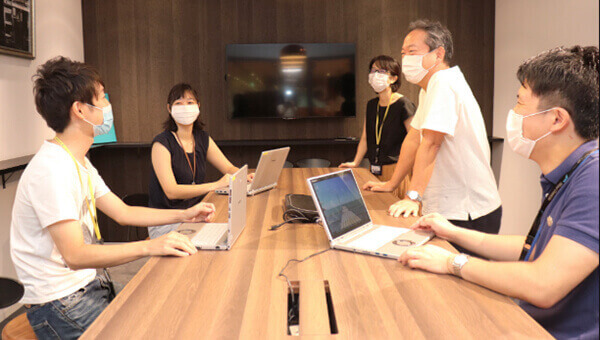
Open calls for internal positions
In 2004, Mitsui Chemicals launched open calls for internal positions for the company to provide options that help employees proactively plan their career and make choices. Currently, this program mainly targets positions for new businesses and those associated with business expansion in growth domains, and we recruit talent four times a year according to the needs of each department. In fiscal 2022, we received 70 applications for a total of 76 open positions. In addition, when recruiting, the divisions with the open positions hold briefings to accurately inform applicants of the responsibilities, requirements, and experience they can expect to gain, thereby improving the matching accuracy. In fiscal 2022, this program helped reassign 17 employees to positions that match their career aspirations.
Initiatives for Reducing Overtime
The Mitsui Chemicals has been promoting activities aimed at reducing to zero the number of employees whose overtime and holiday work hours total 80 hours or more each month, and in recent years, the number of employees who do 80 hours of overtime work per month or more has significantly reduced. Initiatives include skills training to reduce overtime. For non-management employees, we provide time management training, where they learn specific approaches for reviewing and changing work habits, scheduling, and handling emails. For management employees, we provide organizational operation workshop training, where they learn specific approaches to efficiently run their organizations and how to plan for the reduction of overtime work.
In general, chemical plants operate continuously for long periods of time, but when it is necessary to carry out periodic maintenance, the entire plant is shut down for a specific limited period to allow repairs and inspections to both minimize the effect on production and ensure that the equipment is safe. In order to avoid the concentration of work at certain times of the year due to this scheduled maintenance, we reviewed the work and strengthened our workforce, including alumni and contract workers, which resulted in a significant reduction in the number of employees doing over 80 hours of overtime work a month.
Number of Employees whose Overtime Hours Exceeded 80 Hours/Month
(Mitsui Chemicals, Inc. registered employees)
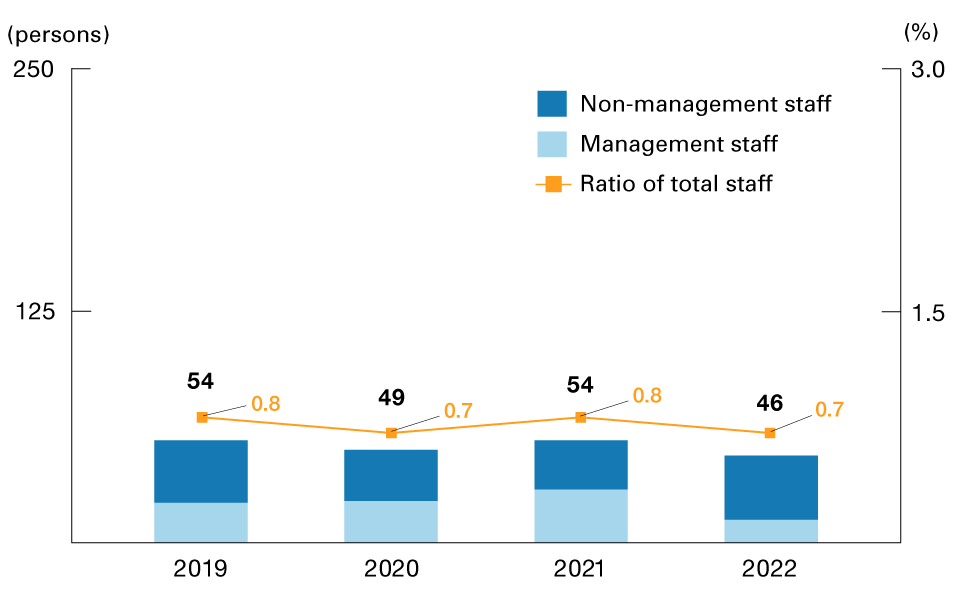
Time Management Training
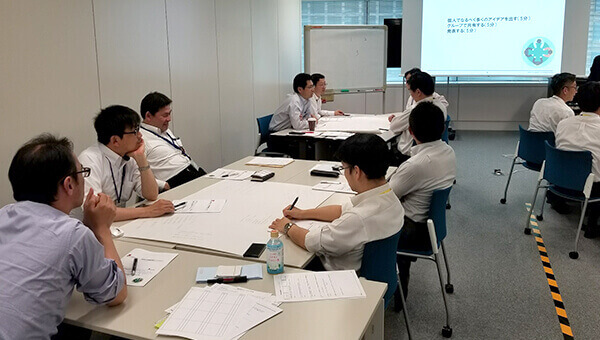
Visualizing Overtime and Hours Worked on Designated Holidays
To visualize overtime and hours worked on designated holidays, the managers share the monthly records of overtime and hours worked on designated holidays for each division and each employee. Each manager is working to establish a comfortable working environment by comparing the overtime and hours worked on designated holidays of other divisions and their own division, and by confirming that work is not concentrated on specific individuals. When an employee is found to have worked more than 80 hours of overtime each month, the Human Resources Division conducts an interview with the manager, and reviews and implements specific measures to identify the cause of the overtime and make improvements for the individual employee.
Work-Life Balance Measures
Mitsui Chemicals has put in place various systems that exceed statutory requirements in response to employees’ circumstances outside of work, including child and family care.
We have introduced systems to support greater flexibility in work styles, including teleworking and the flextime system, and modified our leave system to enable employees to make use of expired annual (special) leave not only for hospitalization but also for medical treatment to support employees’ work-life balance.
Please refer here for the benefit programs and measures.
Principal Employee Benefit Programs and Measures (Mitsui Chemicals, Inc.)
| Annual paid leave | Twenty days per year in units of 0.5 days, starting from the second year of employment. |
|---|---|
| Refreshment leave | Two consecutive days paid leave per year. |
| Special leave | Paid leave taken from any unused annual paid leave (up to 60 days), granted when the employee is unable to work for more than three days due to an illness or injury, family care, childcare or social contribution activities. It may be granted in units of 0.5 days for disease treatment or infertility treatment. |
| Flextime system | No core working hours. Hours worked are counted not in terms of days but over the whole month. |
| Teleworking | Regardless of reasons such as childcare or nursing care, allowed employee to choose to working-from-home arrangements on the condition that attend the workplace for at least four days per month. |
| Ban on side jobs lifted | To enable employees to take side jobs with the approval of the Company, rules on side jobs and how such work is approved have been reviewed. |
| Community service leave | Two days paid leave per year. |
| Leave of absence to accompany spouse’s overseas assignment | Leave of absence for up to three years. |
| Childcare leave | Leave of absence for up to four years, paid for the first five days*1. Male employees are encouraged to take childcare leave. |
| Part-time working option (childcare leave) | Up to three hours per day to care for a child in sixth grade or younger. |
| Company childcare center | Established in 2009 near the Ichihara Works & VISION HUB™ SODEGAURA. |
| Family medical leave | Up to 20 days paid leave per year for medical care, etc., of a family member*2. |
| Family care leave | Up to one year for each family member*2 who requires nursing care or support. |
| Paid family care leave | Up to 20 days paid leave per year for nursing care of a family member*2 who requires nursing care or support. |
| Part-time working option (family care leave) | Up to three hours per day for nursing care of a family member*2. Up to one year for the same reason. |
*1 For the period of absence from work thereafter, approximately 60%–70% of wages will be paid by Mitsui Chemicals Health Insurance Society and unemployment insurance until the child reaches the age of two (maximum of approximately 104 weeks)
*2 Spouse, parents, children, grandparents, spouse’s parents/grandparents, siblings, grandchildren, spouse’s siblings
Please refer here for details of the usage status of other systems.
Support for Participation in Child Care
With the aim of realizing a sustainable society, the Mitsui Chemicals Group is strengthening support for working while raising children, not only by reforming work styles but also by providing specialized support for childcare.
Program That Supports Employees Returning to Work after Taking Childcare Leave
Mitsui Chemicals has introduced a program that supports employees returning to work. The principal goal is to create an environment that allows employees bringing up young children to return to work smoothly after giving birth to their child or taking childcare leave and to help maintain a high degree of motivation. The program clarifies the types and details of support for each period from the time before maternity leave through childcare leave to the return to work. Prior to taking leave, the employee and their manager engage in a one-on-one interview to discuss the handover of duties, contact while they are on leave, necessary procedures, and other important issues. Even before returning to work, meetings between employees and their managers are also conducted to share details of work styles that will ensure the work environment will accept the employee and details of their job description when they return to work, and to ensure mutual understanding. After returning to work, the Company provides an explanation of the procedures and support available from its various programs for employees. In this manner, every effort is being made to relieve employees’ anxieties with respect to taking maternity and childcare leave as well as returning to work. This in turn helps to alleviate the need to resign from the Company and allows employees to continue their careers.
Childcare Leave Usage Rate (Mitsui Chemicals, Inc. registered employees)
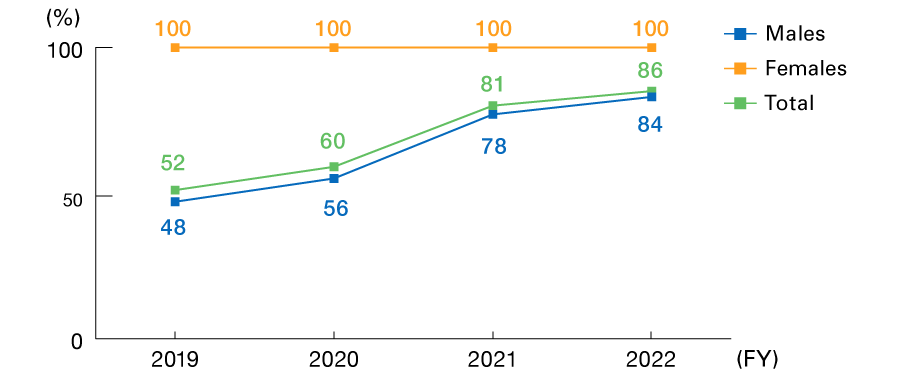
Return Rate of Employees from Childcare Leave (Mitsui Chemicals, Inc. registered employees)
| FY2019 | FY2020 | FY2021 | FY2022 | |
|---|---|---|---|---|
| Males | 100% | 100% | 100% | 100% |
| Females | 100% | 100% | 100% | 100% |
| Total | 100% | 100% | 100% | 100% |
Employee Retention Rate Three Years after Childcare Leave (Mitsui Chemicals, Inc. registered employees)
| FY2019 | FY2020 | FY2021 | FY2022 | |
|---|---|---|---|---|
| Males | 83% | 99% | 93% | 97% |
| Females | 93% | 94% | 76% | 82% |
| Total | 86% | 98% | 90% | 95% |
Greater Participation by Men in Childcare
We promote male participation in childcare and encourage male employees to take the first five days of childcare leave with pay. For male employees on childcare leave, the pregnancy of the employee's spouse first needs to be reported to the Human Resources Division. The Human Resources Division then requests a meeting with the male employee's supervisor, who confirms the employee's intention to take childcare leave and explains the system to the employee. During this process, we ensure that we do not make the confirmation in such a way that discourages the male employees from taking the childcare leave, which is prohibited by law. For male employees who are unsure about whether or not to take childcare leave or how long they can take it, a representative from the Human Resources Division meets with them to discuss how to take childcare leave, including when to take it and the number of times it can be taken, as well as to coordinate with their supervisors to encourage them to take childcare leave. We have also created a guidebook that lists internal systems related to childcare and specific ways to use these systems. In addition to childcare leave, the guidebook introduces systems that can be used for childcare, including annual paid leave, flex time, shorter working hours, and paid nursing and caregiver leave. Furthermore, the site includes messages from management and interviews with male employees and their supervisors who are raising children, encouraging men to be actively involved in childcare as well. In fiscal 2022, we provided an opportunity to explain to department managers the social background behind encouraging male employees to take childcare leave, revisions to the Child Care and Family Care Leave Law, and internal systems, and asked them to share this information within their divisions. Training for all line managers is planned for fiscal 2023.
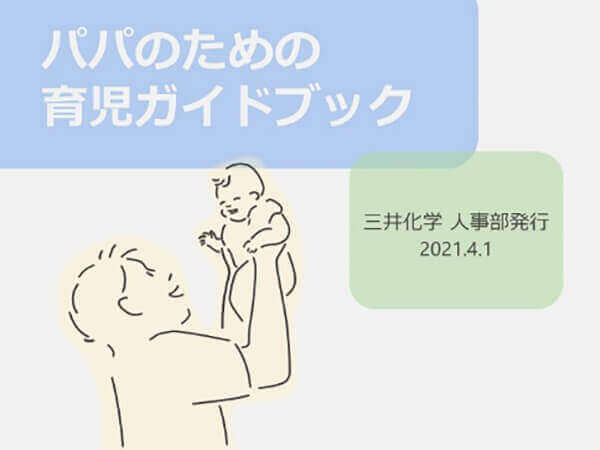
Balancing Nursing Care and Work
The Mitsui Chemicals supports our employees who work while providing nursing care. In order to prevent employees who are nursing caregivers from leaving their jobs, we hold an online seminar every year on the theme of balancing nursing care and work with the aim of promoting the concept of managing nursing care using public and in-house systems. However, participants in seminars tend to be limited because it is difficult for them to become aware of when they may become involved in the caregiving process. Therefore, since fiscal 2021, as an outreach measure, we have been posting useful information for caregivers on our internal portal bulletin board on a quarterly basis. Links to internal and external information are attached to the postings to provide easy access to the detailed information needed. Back numbers are also posted together on the portal, which helps to quickly convey the necessary information to employees who have to start providing nursing care at short notice. The topics we have dealt with include the difference between paid family care leave and family care leave, nursing care insurance certification system, dementia care, communication between parents and children, and cooperation with professionals. Reliable external YouTube videos related to the theme are presented to help them deepen their knowledge of what it takes to care for their loved ones.
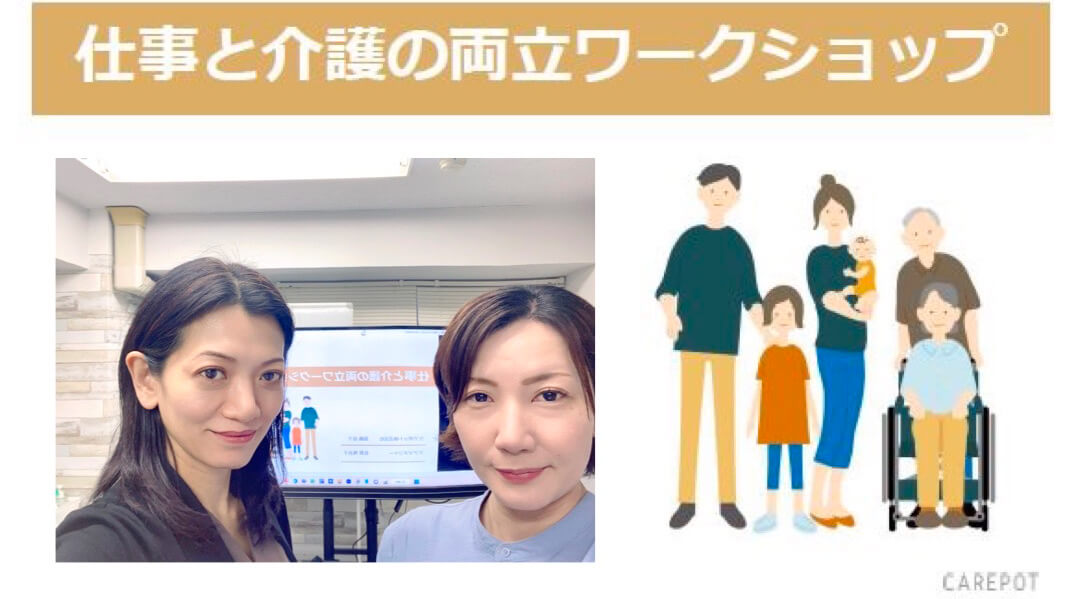
2022 Implementation Event “Workshop on Balancing Work and Caregiving”
(left) Ms. Yoshiko Takahashi, CarePot, Inc. (right) Ms. Yuiko Saga, Care Manager
Job Evaluations for People Taking Childcare/Family Care Leave
Mitsui Chemicals has a program designed to prevent childcare or family care leave from affecting promotion or assessments for payments, bonus payments, etc. Employees who are absent from work for childcare or nursing care reasons will be evaluated fairly based on the degree of achievement of their goals and actions during the period of attendance, as long as the attendance rate for the period subject to evaluation exceeds a certain standard. Their job performance while at work is evaluated fairly, and if their attendance rate is lower than a certain standard, they are exempted from the job evaluation (no rating), so as not to affect their job evaluation or promotion.
Improving the Acquisition of Paid Leave
In the drive to work style reform, Mitsui Chemicals is working to raise the rate of annual paid leave (20 days). We are taking the following actions to improve the acquisition of paid leave, to support the physical and mental health of employees.
Measures to Promote Work Style Reforms
- Recommendations for the planned acquisition of extended leave and continuous leave
- Designating days between holidays for paid leave support and encouraging employees to take leave
- Tabulation of paid leave acquisition rates by worksite and report and guidance based on the findings
- Review of the concentration of workloads on specific employees
- Schedule sharing within the worksite
Paid Leave Usage Rate
(Mitsui Chemicals, Inc. registered employees)
![]() This table is scrollable.
This table is scrollable.
| FY2019 | FY2020 | FY2021 | FY2022 | |
|---|---|---|---|---|
| Non-management staff | 86% | 77% | 84% | 88% |
| Management staff | 70% | 60% | 63% | 64% |
| Total | 79% | 70% | 75% | 77% |
Labor-management Relations Based on Frank Dialog and Communication
In the collective labor agreement, we have established "achieving the Corporate Mission" and "the happiness and self-fulfillment of employees" as goals to be shared by both labor and management and are working on developing labor-management relations that are both constructive and stable. Efforts are also being made to engage in ongoing frank discussions between labor and management on such themes as improving productivity as well as the work-life balance of employees. In this manner, we are working to lay the necessary foundation so that employees can work in a more enjoyable and meaningful manner. Moreover, we have adopted a rule that employees must generally be notified at least one month prior to transfers that entail moving and relocation.
Regular Labor-Management Communication
- Roundtable meetings on management
- Roundtable meetings for each individual theme
- Business site labor-management roundtable meeting
- Labor-management conference
- Labor-management negotiation
- Business site labor-management conference
- Business site labor-management negotiation
- Joint labor-management meetings for surveys, research, etc.
Major Labor-management Discussion Themes (Fiscal 2022)
- Revision of the increase in wages
- Bonus amounts and profit sharing
- Explanation of the management conditions
- Revision of human resources system in accordance with the revision of the Child Care and Family Care Leave Law
- Revision of travel expenses for single employees returning home
- Revision of qualifications, evaluations, and the compensation system (career-track positions) as of April 2023
Mitsui Chemicals has adopted a union shop system; all employees that are eligible to join a labor union under the labor-management agreement agreed upon by labor and management join the labor union. The Mitsui Chemicals Labor Union represents all non-management staff, and the negotiation outcomes between labor and management are applied to all non-management staff without any conditions. According to the labor-management agreement, management staff and other employees at or above the management level are not eligible to join the union.
Overseas sites are operated in a way that allows labor unions to be formed under the labor-related laws of each country and under the freewill of the employees. We do not take any actions whatsoever to limit such moves.
In addition, we define important matters in the collective labor agreement (such as ensuring proper working conditions, human resources development, safety, environment, occupational health, health promotion, improvement of quality control, and disciplinary actions, including for discrimination and harassment) and make sure to obtain the agreement of both the employers and employees.
